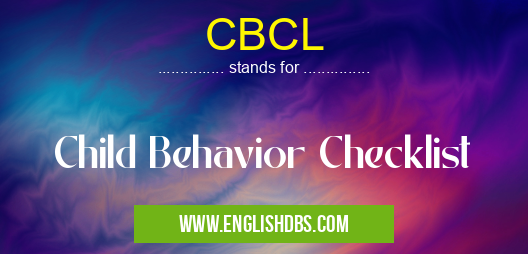What does CBCL mean in MEDICAL
CBCL is an acronym for the Child Behavior Checklist, a screening instrument used to assess emotional and behavioral problems in children. Developed in the 1960s by Achenbach and Edelbrock, the CBCL has become a widely accepted tool for helping parents, teachers, and mental health professionals evaluate the mental health of youths. The CBCL consists of over 100 items that measure different domains of internalizing and externalizing behaviors such as aggression, social interaction difficulties, depression, anxiety, substance abuse, and conduct disorder. It has been used in research as well as clinical settings to identify behavioral issues in children.

CBCL meaning in Medical in Medical
CBCL mostly used in an acronym Medical in Category Medical that means Child Behavior Checklist
Shorthand: CBCL,
Full Form: Child Behavior Checklist
For more information of "Child Behavior Checklist", see the section below.
What is CBCL? The Child Behavior Checklist (CBCL) is an internationally recognized tool used to evaluate child behavior problems in school-aged children between 3-16 years old. Developed by Drs. Thomas M Achenbach and Christopher Edelbrock at the University of Vermont's Department of Psychiatry in 1967, this comprehensive questionnaire consists of more than 100 items that measure various domains across two broad categories
internalizing behaviors (e.g., depression and anxiety) and externalizing behaviors (e.g., aggression). The CBCL has been heavily studied for its reliability and validity in different populations making it one of the most popular questionnaires for assessing child mental health today - especially among educational settings where it's often used as part of an overall evaluation process.
Essential Questions and Answers on Child Behavior Checklist in "MEDICAL»MEDICAL"
What is the Child Behavior Checklist?
The Child Behavior Checklist (CBCL) is a questionnaire that aids parents and other adults in understanding emotional, behavioral, and social development in children ages 6-18. It measures a wide range of functioning abilities and difficulties across a variety of domains such as internalizing, externalizing, attention issues, rule-breaking behavior and academic competence.
Who is eligible to use the CBCL?
The CBCL is suitable for children aged 6 to 18 years old. For those under or over this age range there are other versions of the checklist available.
How reliable is the CBCL?
The CBCL has been carefully developed to be both reliable and valid. Reliability studies show that scores collected from different administrations produce consistent results indicating an acceptable level of consistency over time. Additionally, validity studies have revealed strong correlations between items on the assessment tool and reputed child behavioral problems as experienced by parents or teachers.
Who administers the CBCL?
The primary caretaker (parent, guardian or other adult) completes the assessment about the child's behavior in their home environment. Under specific circumstances a teacher may complete the assessment for their student with parental permission as well.
What type of information does the CBCL generate?
The CBCL produces scores on various dimensions of behavior that can then be compared to national norms to determine if a particular area may need more attention than others. Additionally, it provides valuable insight into areas suspected by primary caregivers as problem areas within a child’s life that might otherwise go unnoticed without comprehensive testing protocols like those featured on the CBCL.
How long does it take to fill out a CBCL form?
Depending on your level of detail inputted into each question, it should take around 10-15 minutes for an average completion time.
Is parent consent required to complete a CBCL form?
Yes, parent consent must be obtained prior to administration and completion of the childhood behavior checklist form.
Are there any risks involved with using the CBCL?
No, there are no known risks associated with completing this assessment tool.
Does my child need specialized training before filling out a CBCL form?
No specialized training is necessary before filling out a Child Behavior Checklist form.
Final Words:
In conclusion, CBCL stands for Child Behavior Checklist which is an internationally recognized tool used to assess emotional and behavioral problems encountered by youths between 3–16 years old. Developed in 1967 by Thomas M Achenbach and Christopher Edelbrock at the University of Vermont’s Department of Psychiatry, this comprehensive questionnaire consists of over 100 items split into two broad categories: internalizing behaviors (e.g., depression) and externalizing behaviors (e.g., aggression). Widely accepted due to its impressive reliability rates across different populations coupled with valid results that can easily be compared against other measures taken on a child’s mental health such as psychological tests - CBCL has become a go-to assessment method amongst educational settings seeking feedback on their students' overall levels of wellbeing.
